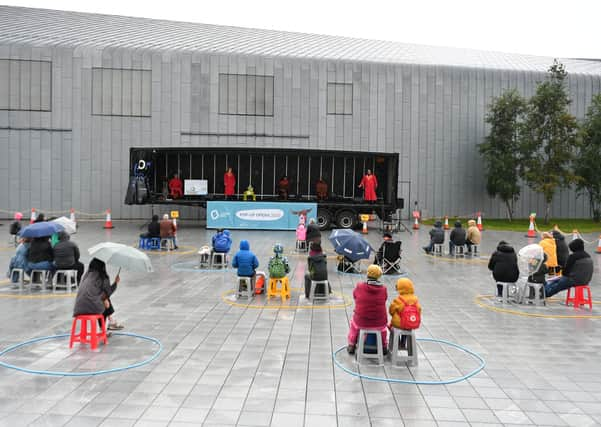Covid: Few signs of hope for Scotland’s cultural sector – Brian Ferguson


I struck autumn gold last week, when a holiday on the Fife coastline coincided with some of the best weather of the year. Long sunny days were spent lazing on virtually deserted beaches and wandering down eerily quiet forest trails. It was almost possible to forget that the country was firmly back in the tightening grip of the coronavirus pandemic. Those daily doses of normality were a welcome distraction from the growing doom and gloom over when any element of Scotland’s cultural scene will be able to bounce back.
In June, when the Scottish tourism industry was told it could start preparing to reopen less than a month later, I felt optimistic it would pave the way for the revival of Scottish culture in the following weeks and months. When cafes, bars, hotels and restaurants began opening their doors in July, and were tentatively followed by museums, galleries and other attractions, I felt sure it was only a matter of time before live entertainment could follow suit.
Advertisement
Hide AdAdvertisement
Hide AdBy now, I was convinced I’d have been out and about experiencing promenade theatre productions and outdoor concerts. I was also pretty hopeful that the first intimate post-lockdown theatre productions would have been up and running before socially distant audiences spread around some of our best-known venues. I was starting to imagine poetry nights in cafes, author readings in bookshops and comedians finally being reunited in the clubs where they have been filming performances for months. All of that seems hopelessly naive given what has unfolded in recent weeks, with rising numbers of coronavirus cases triggering the tightening of restrictions over most walks of life.
While some events have gone ahead – including two well-received productions staged by Scottish Opera at its Glasgow headquarters and on tour around Scotland, and several drive-in events – many others planned over the last few months in the hope and expectation that the world of the pandemic would be over have had to go ahead in the absence of any audiences, or have had the plug pulled on them.
Anyone attempting to stage an outdoor event over the winter – a challenging enough prospect given the unpredictable climate – has the impossible task of trying to second-guess what restrictions may be in place when it comes around. Indoor events are even more difficult to plan for as they are seen as posing greater risks of spreading Covid-19 and are still banned.
If anything, it feels like the dreaded “new normal” of Scottish culture will see it experienced almost exclusively online for the foreseeable future. Book festivals like Wigtown and Bloody Scotland have been following Edinburgh in staging full online programmes, the first-ever online Gaelic music festival was launched last weekend and the Scottish Baftas will be going ahead in virtual form later this year. Several bands have experimented with streaming live gigs from empty venues, most notably Biffy Clyro’s album launch at the Barrowland Ballroom, and Skerryvore’s recent takeover of Clydeside Distillery in Glasgow.
It is anyone’s guess when infection rates will come down enough to allow indoor events to resume – although why people can go to cafes, bars, restaurants and hotels, yet audiences and performers must be kept apart, remains a mystery to me. With social distancing widely expected to be with us well into 2021, the only certainty seems to be that any events which do happen will be a whole lot different to what they were like before March. But they will still be a whole lot better than next to nothing.
A message from the Editor:
Thank you for reading this article on our website. While I have your attention, I also have an important request to make of you.
With the coronavirus lockdown having a major impact on many of our advertisers - and consequently the revenue we receive - we are more reliant than ever on you taking out a digital subscription.
Subscribe to scotsman.com and enjoy unlimited access to Scottish news and information online and on our app. With a digital subscription, you can read more than 5 articles, see fewer ads, enjoy faster load times, and get access to exclusive newsletters and content. Visit www.scotsman.com/subscriptions now to sign up.
Advertisement
Hide AdAdvertisement
Hide AdOur journalism costs money and we rely on advertising, print and digital revenues to help to support them. By supporting us, we are able to support you in providing trusted, fact-checked content for this website.
Joy Yates
Editorial Director
Comments
Want to join the conversation? Please or to comment on this article.